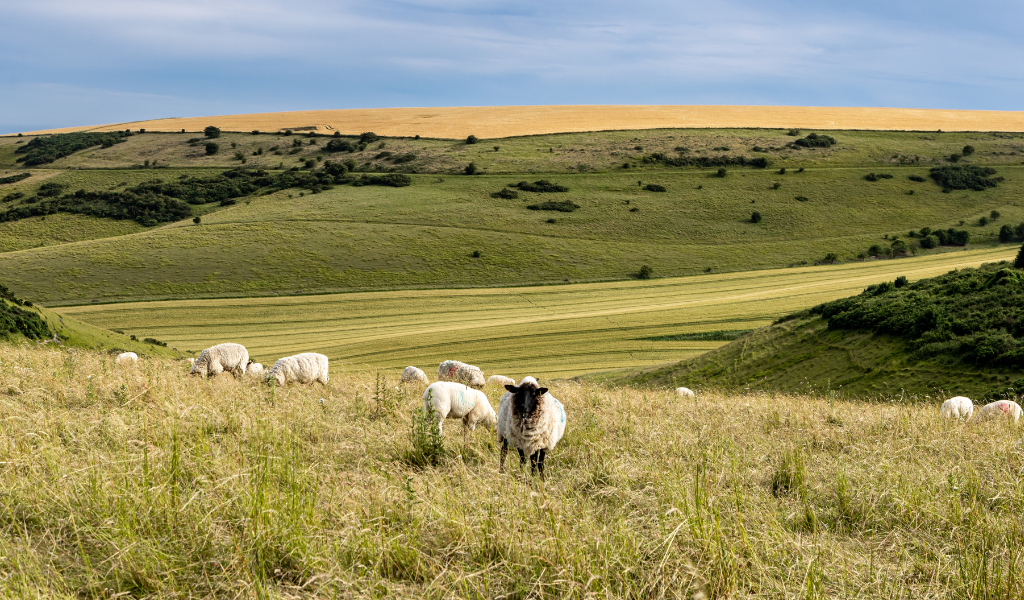It is World Rewilding Day today, an international celebration to raise awareness of “the benefits of wilder nature for wildlife, people and planet.” Rewilding is about letting nature recover in its own direction and usually comprises reducing human control and management of ecosystems.

In the UK, rewilding has gained momentum in recent years due to pioneering private projects . It now holds the potential for expansion and consolidation within the framework of net zero targets set out by government. The time is right to ask: How can nature recovery work for nature and people? And how can national net zero targets best align nature recovery with livelihood security of farmers and the rights of all people to access healthy, affordable and ecologically sound diets?
We do not yet have the answers to these challenging questions, but our new study supported by the AFN Network+ is looking for them. Our project, Roots of Change: a just wilding transition for the agri-food system, is a collaboration between IDS, the University of Sussex and Sustain: the alliance for better food and farming which focuses on nature recovery in agrifood landscapes in the Sussex region, in the Southeast of the UK.
Rewilding efforts in the Sussex region
This region has been the backdrop of noteworthy rewilding efforts, including the pioneering work by Knepp, a 3,500-acre rewilding project that has been running for 20 years, and Weald to Waves, a network of farmers, land managers, community groups and other local stakeholders that aims to create a nature recovery corridor across 20,000 hectares of contiguous land from the High Weald to the Sussex coast. The South Downs, that envelop the city of Brighton & Hove, have recently seen the establishment of other exciting projects, which also add a local food systems angle to nature recovery efforts. For example, Land Use Plus, a project led by the Brighton & Hove Food Partnership, encourages nature friendly farming that produces food and protects and restores rare local habitats, specifically extensive grazing in the chalk grasslands, dubbed as the “Our project seeks to learn from these and other local initiatives to understand the challenges and opportunities in connecting nature recovery, nature-friendly food production, and farming livelihoods and ways of live.
We are aware that the debate in this field can be quite , with many farmers expressing distrust about rewilding and land use change to meet net zero targets. A study by WWF noted that ‘many in the farming community have perceived rewilding to be a direct attack on their livelihoods and ways of life’. Another study on farmers attitudes towards rewilding found that these centre on five core issues: (a) the perceived need (or lack of) for restoration action, (b) the ecological effectiveness of rewilding, (c) rewilding’s compatibility with ensuring food security, (d) rewilding’s compatibility with rural lifestyles, livelihoods and economies and (e) multidimensional justice of rewilding initiatives. With farming taking up 71% of land in the UK, farmers are key stakeholders in debates about rewilding and land use change. They are being offered incentives to restore nature on their land as part of post-Common Agricultural Policy (CAP) farm payment schemes including Countryside Stewardship and Landscape Recovery funds. There has also been an increase in private nature recovery and offsetting schemes.
But there have been criticisms of some so-called ‘nature based’ approaches as ignoring the inequalities of power and wealth that lock in unsustainability farming practices. Also, the management of Environmental Land Management (ELM) schemes is concerning, with the sudden closure of Sustainable Farming Incentive (SFI) scheme for applications without advance warning leaving thousands of farmers stranded and with no clear opportunities to enter into agri-environmental schemes.
Building bridges and addressing barriers
Notwithstanding the challenges, we are hopeful that we can help build bridges between different perspectives and find common ground. To help us with this exploration of how nature recovery efforts can best deliver for people and nature in integrated fashion, we adopt a relational socio-ecological justice that recognises “the right of human and non-human worlds to live and flourish together in their environments free from social and ecological destruction and degradation.”
Equipped with this integrated justice framework, Roots of Change will incorporate field work and talk to a diverse range of stakeholders, comprising farmers, farm workers, rewilding champions, local community projects, local authorities, to explore where and how rewilding projects have successfully incorporated principles of a socio-ecological justice, and the perspectives of those in rewilded landscapes.
The project will look at the barriers to socio-ecologically just rewilding – including local and national policies, information, perceptions, biases, financial constraints, and how they may be overcome. Through this project, we also aim to explore the ways in which policy opportunities over the next 9 months can incorporate socio-ecologically just rewilding, and where the policy landscape offers opportunities, nationally and locally.
Rewilding offers a promising pathway out of the climate and environmental crises, but its success depends on striking a balance—aligning nature recovery with people’s needs, nature friendly food production, and ways of life. By fostering inclusive solutions that prioritise nature recovery and socio-ecological wellbeing, we can create a future where thriving landscapes and resilient communities go hand in hand.
Follow us on this journey here!
